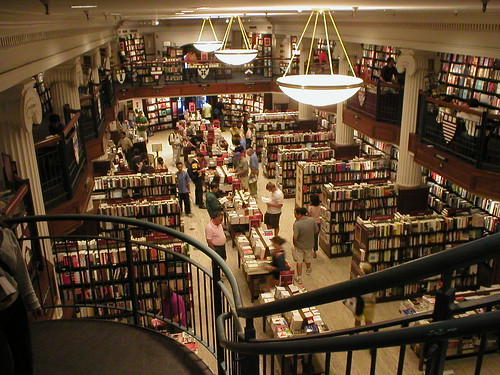Jane Eyre: There are myriad reasons I love Jane Eyre, but one is for the gothic creepfest that is Mrs. Rochester. In the spookiest scene, Jane is in her bedroom at night, hears breathing through the keyhole, then fingernails scratching down her door. She realizes it's unlocked, quickly reaches to lock it, and immediately afterwards the would-be intruder violently rattles her doorknob and laughs maniacally in the passageway.
The Fellowship of the Ring: My dad agrees with me that although there are many scary parts of The Lord of the Rings series, the one that gives us the shudders is when Frodo and the other hobbits are being pursued through The Shire by the Black Riders (and their intent is still somewhat vague), and at one point Frodo hides in the woods with the road in sight. A Black Rider appears on the road, stops his horse, climbs stealthily off, and the hooded character creeps along the ground as though smelling the hobbits' tracks. In spite of the other scenes fraught with death and doom, it's the insidious presence of the Riders in the heretofore secure Shire that troubles me most.
The Golem's Eye: This book is the second and best book in the Bartimaeus Trilogy, and it contains the one scene in the entire series that really won me over. In Westminster Abbey late at night, Kitty and her friends break into the crypt and unwittingly awake an insane afrit (an evil spirit animating a skeleton). Everyone flees, most of them are killed, but Kitty pauses by the abbey doors when she hears the voice of her friend echoing inside the dark church. She knows her friend is dead, and she knows the monster is mimicing his voice to trap and murder her. However, in a split second Kitty decides it would be morally wrong to abandon her friend's call for help and returns inside knowing it will mean her death. I find Westminster Abbey deliciously macabre even in the daytime, so it's a setting that easily affects me, but the moral dilemma raises it above an ordinary ghost story.
The Eyre Affair: Though the Thursday Next series is primarily comic, Acheron Hades is a villian who gives me the chills in a big way. Early in this first book, Thursday is responding to a crime scene. As an old woman flees the scene, Thursday suddenly remembers that Acheron's mind control abilities can make him appear as someone else. She watches as the old woman steps in a puddle and leaves a man's footprint, then turns her gun on the criminal. (Unfortunately, Acheron is impervious to bullets.)
Outside Over There: This picture book by Maurice Sendak is one I loved as a child, and the most horrifying scene is when Ida finds a ghastly foundling child carved of ice in the cradle and realizes her baby sister has been kidnapped by goblins.
The Book of Lost Things: The protagonist is confronted by a bloodthirsty wolf who stands on his hind legs and talks like a man, and you realize the creature is half and half, and a cannibal of both species. At the end of the book, the revelation of who the trickster character is also terrifying, but I won't give it away.
Jonathan Strange and Mister Norrell: The Man with the Thistledown Hair. Enough said.
Also wonderfully frightening:
 "Mr. Simonelli or the Fairy Widower" (a short story from Susanna Clarke's collection, The Ladies of Grace Adieu), The Abhorsen Trilogy by Garth Nix (I would have put this on this list but couldn't narrow it down to one scene), anything by Edward Gorey in which the Black Doll appears.
"Mr. Simonelli or the Fairy Widower" (a short story from Susanna Clarke's collection, The Ladies of Grace Adieu), The Abhorsen Trilogy by Garth Nix (I would have put this on this list but couldn't narrow it down to one scene), anything by Edward Gorey in which the Black Doll appears.













